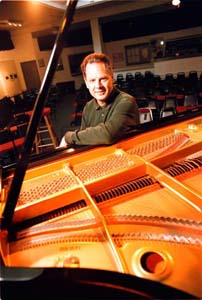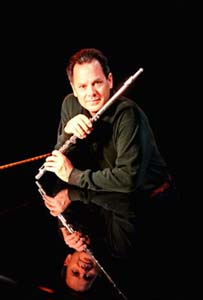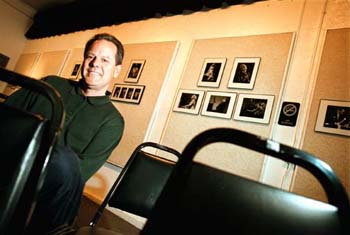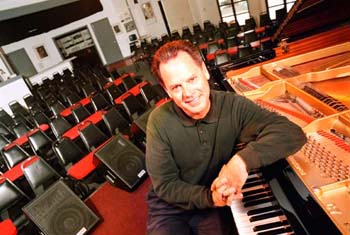![[MetroActive Arts]](/arts/gifs/art468.gif)
[ Arts Index | Santa Cruz Week | MetroActive Central | Archives ]
Keeping Time
Action Jackson: Cool and collected Tim Jackson, executive director of Kuumbwa and general manager of the Monterey Jazz Festival, has earned a place as one of the foremost jazz presenters on the West Coast.
After building a premiere Santa Cruz jazz center, Tim Jackson brings new life to the Monterey Jazz Festival
By Rob Pratt
SOMEONE SHOULD WRITE a song for Tim Jackson. He spends his life around music--as longtime director of the Kuumbwa Jazz Center and for the past six years as general manager of the Monterey Jazz Festival. Day in and day out, he immerses himself in some of the greatest jazz music in the world.
He's also one of the foremost music presenters in the country, arguably one of the reasons that live jazz is going strong all over the West Coast. And though his other gigs have cut into the time he can dedicate to performance, when he takes the stage with his band, Real Time, at a place like the Crow's Nest, Jackson demonstrates that he is a highly capable flutist and composer. Still, no one has immortalized him with a song, as Gerry Mulligan did for his predecessor at the Monterey Jazz Festival, the inimitable Jimmy Lyons, in "Line for Lyons."
No doubt Jackson hardly notices. A fit, clean cut and soft-spoken man of 45, he chooses words carefully, not out of hesitation or suspicious reserve, but out of an inherent directness that gets to the center of the issue without superfluous flourishes. One thing he's direct about is that all of the work he does, all of the music he brings to the public and all of the music-education endeavors he leads wouldn't be possible without many dedicated co-workers.
Taking the helm at the Monterey Jazz Festival in 1993 (this year's festival runs Friday to Sunday), Jackson cranked up the festival's rosters with a savvy ear for current stars and promising newcomers, taking the once stagnating festival to new heights in attendance and profitability. And he did it all with a cool, collected calm and a deep respect for people that are rare among music presenters.
"I think I do play a part in the success of both organizations," he says of heading two of the best-known jazz presenting groups on the West Coast. "But there are a lot of people who play an active part in keeping both organizations going."
Outline for a tune about Tim Jackson: something with drive and detail; something that demands sophisticated playing and an attentive ear from everyone in the band; something that has elements of tradition but remains flexible enough to stay immediate. Think of "Footprints" by Wayne Shorter or maybe "Havona" by Jaco Pastorius.
JAMES COSTELLO, A MUSIC teacher at Pacific Grove Middle School, remembers meeting Tim Jackson in the early '90s. A member of the Monterey Jazz Festival's board of directors (he currently serves as its president), Costello saw the prestigious jazz organization grow staid and predictable through the '80s as founder Jimmy Lyons tired of running it.
When Lyons finally decided to retire (it was a backstage collapse during a festival performance that convinced him, Costello recalls), the board of directors drew up a list of things they wanted in the next general manager. As it turns out, he adds, another board member at the time, who has since died, already seemed to have her mind made up about Jackson.
"Ruth Fenton had had some cooperative work at Kuumbwa when some of her students had played up there," he says. "She was ill with cancer at the time, and one of the last things she wanted to do for the Monterey Jazz Festival was to find an executive director. She was the one who inspired us to look at Tim Jackson."
The festival desperately needed new blood, Costello continues. The person they sought would have to have a solid foundation in traditional jazz, which is where the Monterey Jazz Festival had earned its reputation since 1958, but also an ear for the new. It would have to be someone who could honor the artists who made it the granddaddy of American jazz festivals but who also could develop new players to take their place.
"We were going through a time when many of the older artists were dying off on us," Costello explains. "We needed someone who could be a bridge between now and then--it was very important to what we were doing. And we just thought it was a natural when we met Tim."
Jackson had just celebrated Kuumbwa's 15th anniversary in 1990 when he heard that Lyons was leaving. Oddly, he knew little about the Monterey Jazz Festival, only attending twice--once as a performer with one of his Latin jazz bands.
"I had never frankly paid attention to Monterey," he says. "So I sent off a letter. I was somewhat skeptical. I just figured, boy, an organization as old and established as Monterey--I'm sure they have a chain of command lined up for three blocks as to who would be in line to succeed Jimmy Lyons. I just shot off a letter and forgot about it. Four months later, they called me up."
In talking about earning the nod as the festival's general manager, Jackson comes as close as he ever does to expressing disappointment. He still speaks matter-of-factly, telling what happened like a historian reserving judgment. But, he says, he had come upon the position at the festival looking for a new challenge after 15 years with Kuumbwa. And though the transition the festival faced seemed as if it would require full-time attention from a general manager, the board outlined only a part-time position for him.
"The more I think about it, the more I like it," he remarks in hindsight. "The good thing about Kuumbwa is that it keeps going every week and keeps me current. It's turned out to be great for both organizations.
"What Jimmy Lyons lost over the years," Jackson continues, "was the interest and ability to want to keep current. What was happening in the jazz world was not of much interest to him."
Jackson's festival connection has also turned out to have benefits for Kuumbwa as well. However well respected it is, Kuumbwa hardly registers with big talent agencies like the William Morris Agency, which represents superstar jazz guitarist Pat Metheney. "Pat Metheney wouldn't have played here [at Kuumbwa] had there not been a connection between me and Monterey," Jackson says. "It's those kinds of things that are really working out positively for both organizations."
'MONTEREY'S A PRETTY eclectic festival," Randall Klein tells me. "It's really a quality festival, and Tim Jackson has really reinvigorated it." As executive director of the San Francisco Jazz Festival, Klein has worked with Jackson for years, lately collaborating on an endeavor called the Western Jazz Presenters Network. Jackson, he adds, has definitely achieved the aims the Monterey Jazz Festival's board of directors set out for him.
A rundown on the 42nd Monterey Jazz Festival weekend
"It was a quality festival always," Klein continues, "but it came under a little criticism for being staid. For the first 20 years, it couldn't be beat. Now Tim has brought it back there, focusing on much more than just the artists that made it great. It has a different feel."
Three years ago, Klein and Jackson extended the Kuumbwa Jazz Center's founding ideas outward with the Jazz Network. The network brings together a couple dozen groups interested in live jazz to pool resources and promote tours for great players.
"The goal is to build tours and block book them," Jackson explains. "We get together, and maybe our friend from Albuquerque, who has a space very similar to Kuumbwa, says, 'Boy, I'd really love to bring in Sonny Fortune.' Someone else says, 'Yeah, I'd love to do that,' and you get six people interested and you try to coordinate dates you can do it. Instead of him calling up Sonny's manager and saying, 'Well, gee, can Sonny come out and play one night in Albuquerque?' and by the time you add up the cost to fly a band to Albuquerque and back for one night, it doesn't pay out, you can say, 'Look, we've got a little tour--we've got eight gigs out here or 10 gigs,' [and] everybody can amortize the cost."
So far, he continues, the idea has worked out as well as he expected. It's allowed the group to bring out lesser-known artists who otherwise would never have the resources to stop at a place like Kuumbwa. And it has helped keep the business of live jazz booming on the West Coast.
"I would say when I go to jazz business conferences, the people that generally seem to be going the best are the presenters, which are the festivals and not-for-profit centers like us," he adds. "I think the business of live jazz is pretty healthy right now. If I was in jazz radio or in the jazz department of a major-label record company [however]--they always seem to be playing the blues.
Copyright © Metro Publishing Inc. Maintained by Boulevards New Media.
![]()
 George Sakkestad
George Sakkestad

The fact remains, though, that he has been at the center of the live jazz industry since the mid-'70s. With KUSP programmer Rich Wills and singer Sheba Burney, he founded the Kuumbwa Jazz Center 24 years ago ("There were several people involved early on, but the three of us were really the nucleus, and really for the first couple of years it was them more than me," he says) and with it pioneered the nonprofit promotion of jazz concerts--which in part helped jazz gain new respect as an art form.


![[line]](/gifs/line.gif)
![[line]](/gifs/line.gif)
From the September 15-22, 1999 issue of Metro Santa Cruz.